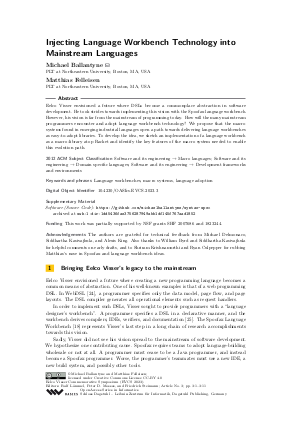@InProceedings{ballantyne_et_al:OASIcs.EVCS.2023.3,
author = {Ballantyne, Michael and Felleisen, Matthias},
title = {{Injecting Language Workbench Technology into Mainstream Languages}},
booktitle = {Eelco Visser Commemorative Symposium (EVCS 2023)},
pages = {3:1--3:11},
series = {Open Access Series in Informatics (OASIcs)},
ISBN = {978-3-95977-267-9},
ISSN = {2190-6807},
year = {2023},
volume = {109},
editor = {L\"{a}mmel, Ralf and Mosses, Peter D. and Steimann, Friedrich},
publisher = {Schloss Dagstuhl -- Leibniz-Zentrum f{\"u}r Informatik},
address = {Dagstuhl, Germany},
URL = {https://drops.dagstuhl.de/entities/document/10.4230/OASIcs.EVCS.2023.3},
URN = {urn:nbn:de:0030-drops-177737},
doi = {10.4230/OASIcs.EVCS.2023.3},
annote = {Keywords: Language workbenches, macro systems, language adoption}
}

 Creative Commons Attribution 4.0 International license
Creative Commons Attribution 4.0 International license
